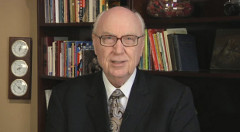 I’ve been helped by a lot of books in my lifetime. The Bible has helped me more than any other book—by several orders of magnitude.
I’ve been helped by a lot of books in my lifetime. The Bible has helped me more than any other book—by several orders of magnitude.
Here is what the Bible claims it can do for you:
1. It will inspire you. When I read the story of David killing his giant enemy with nothing but five stones and a sling, I start to think that maybe I can conquer the giants in my life. When I read the story of Daniel rising to become prime minister of a large foreign country, I think maybe I can do a little more than I am right now.

 The late great American preacher Clarence McCartney recounted ministering at the funeral of a young husband. He stood by the coffin and listened as the young widow poured out her soul in grief. Finally he said to her: “God will give you strength and faith, and out of this will come good.”
The late great American preacher Clarence McCartney recounted ministering at the funeral of a young husband. He stood by the coffin and listened as the young widow poured out her soul in grief. Finally he said to her: “God will give you strength and faith, and out of this will come good.” If you’ve been tracking my posts recently, you know that I have just returned from speaking at a conference in Australia. I understand the significance of conferences and their service to the body of Christ, but as a pastor, it is very easy to get caught up with the hoopla and adrenaline that big gatherings bring.
If you’ve been tracking my posts recently, you know that I have just returned from speaking at a conference in Australia. I understand the significance of conferences and their service to the body of Christ, but as a pastor, it is very easy to get caught up with the hoopla and adrenaline that big gatherings bring. Growing up in Assemblies of God churches, I often heard preaching in an imperative—even imperial—mode. Pastors operated with a command-and-control model of leadership that carried over into the pulpit.
Growing up in Assemblies of God churches, I often heard preaching in an imperative—even imperial—mode. Pastors operated with a command-and-control model of leadership that carried over into the pulpit. Joseph’s descendants were very different than him. They obeyed when their desires were met and when God manifested His mighty power on their behalf. Whenever they were discouraged or felt abandoned, they quickly drifted into disobedience.
Joseph’s descendants were very different than him. They obeyed when their desires were met and when God manifested His mighty power on their behalf. Whenever they were discouraged or felt abandoned, they quickly drifted into disobedience. After following the news in the wake of last week’s terror attack at the Boston Marathon, it is obvious and understandable that emotions in our nation run the gamut.
After following the news in the wake of last week’s terror attack at the Boston Marathon, it is obvious and understandable that emotions in our nation run the gamut. The Petersen House in Washington D.C. is the house across the street from Ford’s Theatre, where a mortally wounded Abraham Lincoln was taken after being shot by John Wilkes Booth. A few hours later, Lincoln succumbed to his wounds and, as then Secretary of War Edwin Stanton observed, passed into the ages.
The Petersen House in Washington D.C. is the house across the street from Ford’s Theatre, where a mortally wounded Abraham Lincoln was taken after being shot by John Wilkes Booth. A few hours later, Lincoln succumbed to his wounds and, as then Secretary of War Edwin Stanton observed, passed into the ages. I believe the most overlooked key to growing a church is this: We must love unbelievers the way Jesus did. Without His passion for the lost, we will be unwilling to make the sacrifices necessary to reach them.
I believe the most overlooked key to growing a church is this: We must love unbelievers the way Jesus did. Without His passion for the lost, we will be unwilling to make the sacrifices necessary to reach them. On my recent trip to Johannesburg, South Africa, over dinner we were blessed to have a friendly waiter named Everest. It’s not very often that you meet a man named Everest; he is actually my first.
On my recent trip to Johannesburg, South Africa, over dinner we were blessed to have a friendly waiter named Everest. It’s not very often that you meet a man named Everest; he is actually my first. Mary, the mother of Jesus, knew that faith and obedience are the keys to God’s blessing, so she chose to go with God’s destiny for her life
Mary, the mother of Jesus, knew that faith and obedience are the keys to God’s blessing, so she chose to go with God’s destiny for her life
 Righteousness is the answer to everything!
Righteousness is the answer to everything! “So if the Son sets you free, you will be free indeed.” (John 8:36, NIV)
“So if the Son sets you free, you will be free indeed.” (John 8:36, NIV) In the aftermath of recent tragic killings, such as those that have taken place in New Mexico, Connecticut and Colorado, our nation has focused on ways to curb gun violence.
In the aftermath of recent tragic killings, such as those that have taken place in New Mexico, Connecticut and Colorado, our nation has focused on ways to curb gun violence. “To keep me from becoming conceited because of these surpassingly great revelations, there was given me a thorn in my flesh, a messenger of Satan, to torment me...” (2 Cor. 12:7)
“To keep me from becoming conceited because of these surpassingly great revelations, there was given me a thorn in my flesh, a messenger of Satan, to torment me...” (2 Cor. 12:7) Before Jesus died, He willed us His peace. But we forfeit His gift through strife.
Before Jesus died, He willed us His peace. But we forfeit His gift through strife. Our discouragement can open the way for the adversary to kill, steal from and destroy us.
Our discouragement can open the way for the adversary to kill, steal from and destroy us.
